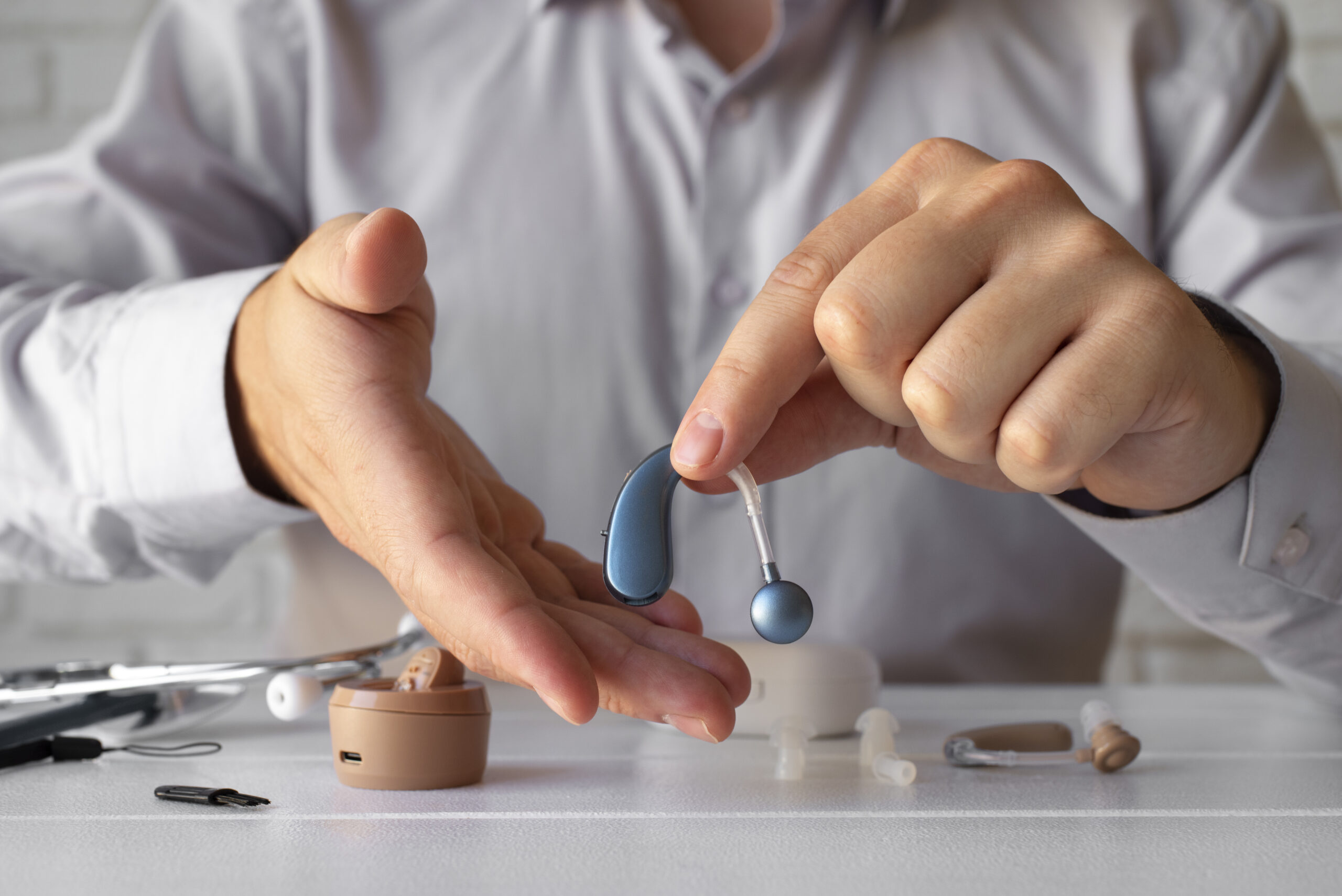Table of Contents
Hearing aids are life-changing devices that allow people with hearing loss to connect with the world around them. But like any advanced piece of technology, they require regular care to perform at their best. Proper maintenance not only improves daily performance but also prolongs the life of your device, saving you unnecessary repair costs and ensuring you always hear clearly.
In this guide, we will explore why hearing aid maintenance is important, the role of hearing aid cleaning, best hearing aid care tips, the value of hearing aid servicing, and how you can troubleshoot common issues to keep your device in optimal shape.
The Importance of Hearing Aid Maintenance
Many people assume that once they purchase hearing aids, they will work indefinitely. However, hearing aids are exposed to moisture, earwax, dust, and daily wear, which can affect their performance. Without proper care, sound quality may drop, feedback noises may occur, or the device may stop working altogether.
By taking preventive steps, you can:
- Prolong hearing aid life – Maintenance helps you get the most out of your investment.
- Ensure consistent sound quality – Clean and serviced devices deliver clearer and more natural sound.
- Reduce repairs – Regular maintenance prevents issues from becoming serious.
- Protect your health – Dirty hearing aids may cause ear infections if not cleaned properly.
Regular hearing aid servicing not only improves performance but also extends the lifespan of your device. Many hearing aid users in Singapore visit trusted centres such as The Hearing Centre for routine adjustments, hearing aid repairs and servicing, and professional cleaning.
Hearing Aid Cleaning: The Foundation of Maintenance
One of the simplest but most important steps in maintenance is regular hearing aid cleaning. Since hearing aids sit inside or around your ears, they naturally collect earwax, oils, and sweat. Over time, this buildup can clog microphones and receivers.
Daily Cleaning Tips:
- Wipe your hearing aids with a soft, dry cloth after removing them.
- Use a small cleaning brush or tool to remove wax from the openings.
- Never use water, alcohol, or cleaning chemicals directly on your device.
Weekly Cleaning Tips:
- Check the microphone and receiver for blockages.
- Replace wax guards if necessary.
- Ensure tubing (for behind-the-ear models) is free of moisture or debris.
Hearing Aid Care Tips for Everyday Use
Good habits can make a huge difference in how long your hearing aids last. Here are some simple hearing aid care tips:
- Store in a dry case – Moisture is one of the leading causes of hearing aid damage. Use a dehumidifier box or drying kit.
- Avoid extreme temperatures – Do not leave your devices in hot cars or humid bathrooms.
- Handle with care – When removing or inserting hearing aids, do so over a soft surface to avoid accidental drops.
- Check batteries – Replace or recharge batteries regularly to avoid leakage or sudden shutdowns.
- Schedule professional servicing – Even with regular at-home care, periodic professional cleaning is essential.
Hearing Aid Servicing: Professional Care
While personal care is crucial, professional hearing aid servicing ensures your device continues working like new. Audiologists have the right tools and expertise to check for issues that may not be visible to the eye.
During a servicing appointment, professionals will:
- Deep clean all parts of your hearing aid.
- Replace filters, wax guards, and tubing if needed.
- Perform software updates (for digital models).
- Replace batteries or seek servicing at The Hearing Centre.
If issues persist, you may need professional hearing aid repairs.
Prolonging Hearing Aid Life
Hearing aids are an investment, and with the right care, they can last 4-5 years or longer. To prolong hearing aid life, combine at-home maintenance with regular servicing. Some strategies include:
- Use protective cases when not in use.
- Cleaning after each day of wear.
- Keeping your ears clean to reduce wax buildup.
- Avoiding DIY repairs – always consult a professional if you notice an issue.
Hearing Aid Troubleshooting: Fixing Common Issues
Even with proper maintenance, you may encounter problems. Here are some hearing aid troubleshooting tips:
- No sound – Check the battery level, replace wax guards, and clean microphone ports.
- Distorted or weak sound – Ensure the receiver is not clogged, and change filters.
- Whistling or feedback – Hearing aids may be inserted incorrectly, or the earmold may be loose.
- Intermittent sound – Moisture could be affecting the device; use a dehumidifier overnight.
If these steps don’t work, seek professional repair services.
Why Regular Hearing Aid Maintenance Benefits You
Proper maintenance is not just about the device; it’s about your quality of life. With clean, well-functioning hearing aids, you enjoy:
- Clear conversations – No more straining to hear loved ones.
- Better work performance – Improved communication in meetings.
- Social confidence – Comfort in group discussions and events.
- Hearing health protection – Reduced risk of infections and ear irritation.
Conclusion
Hearing aids are powerful tools that reconnect you with the world of sound. But like any technology, they need care to perform at their best. From hearing aid cleaning and care tips to servicing, troubleshooting, and strategies for prolonging hearing aid life, consistent maintenance ensures your devices last longer and deliver clear, reliable sound.
Whether you need routine servicing, a hearing test, or advanced options like a cochlear implant, The Hearing Centre is a trusted choice in Singapore for complete hearing care.
Frequently Asked Questions
You should wipe them gently with a dry, soft cloth every day to remove dirt, oils, and earwax. A deeper clean with the right tools should be done weekly to prevent wax buildup that can block sound and reduce performance.
No, water and cleaning chemicals can damage the sensitive electronic parts inside your hearing aids. Instead, always use a dry cloth, a small cleaning brush, or tools provided by your audiologist to keep them safe. However, you may clean the rubber or earmould with the solution provided.
Wax guards should be replaced whenever they become clogged. For most people, this is every few weeks, but it depends on how much earwax you produce. If sound suddenly becomes weak or muffled, check the wax guard first.
Yes, professional servicing is important at least once or twice a year. Your audiologist can deep clean your device, check for damage, make adjustments, and update the software to keep it working properly.
The best option is to keep them in a dry box or dehumidifier case. This protects them from moisture, which is one of the most common causes of hearing aid damage. It also helps prevent bacterial growth.
With good care and regular maintenance, hearing aids can last between 4-5 years or even longer. Their lifespan depends on how well they are cleaned, serviced, and stored.
First, check if the battery is charged or properly inserted. Next, clean the microphone and receiver openings and replace the wax filters if needed. If the problem continues, schedule a visit with your audiologist.
Yes, dirty hearing aids can trap bacteria and moisture, which may lead to ear infections. Regular cleaning keeps your hearing aids hygienic and safe for daily use.
It’s best not to. Hearing aids are delicate devices, and trying to fix them at home can cause further damage. Always let a trained professional handle repairs.
Clean and well-maintained hearing aids deliver clear, consistent sound. Without proper care, you may notice muffled audio, distortion, or feedback, which can make communication harder.

Evlin is passionate about helping people with hearing loss. With years of experience in audiology, she has diagnosed and treated a wide range of hearing conditions across all age groups. She is accredited to conduct comprehensive hearing assessments and provide treatments for patients from newborns to the elderly. Committed to personalized care, she strives to empower patients to fully engage in life with better hearing.
Designation: Clinical Audiologist
Qualification: Bachelor of Health Science (Honours) (Audiology), University of Science Malaysia
Membership: .Society of Audiology Professionals in Singapore (SAPS)
